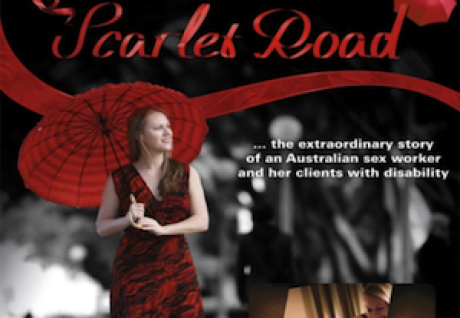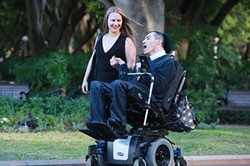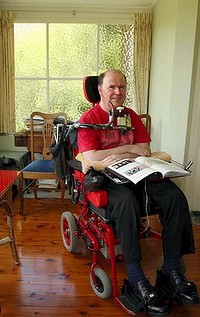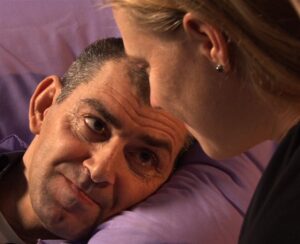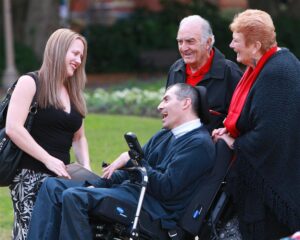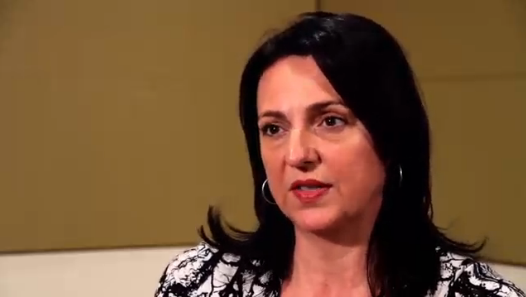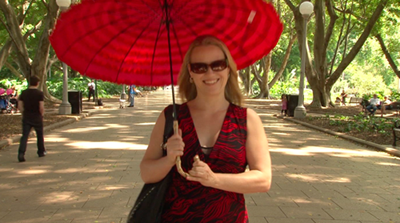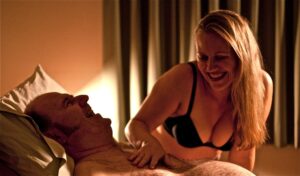Posted on March 6, 2012

At this year’s South by Southwest Festival, a very interesting documentary is premiering about Rachel Wotton. She is a “sex worker” in Australia who works for the rights of not only her fellow specialists but also for a manner of service that is liable to get some extra attention in 2012 thanks to a film that just premiered at Sundance. I spoke with Rachel and filmmaker Catherine Scott about one of the films that fest audiences in Austin should have on their radar.
Catherine, what drew you to the subject matter and how did you go about cajoling Rachel into being a part of the project?
CATHERINE: Rachel and I met over a decade ago. We hit it off immediately and she has been part of my inner circle of friends ever since. In the early days we flirted with the idea of making a documentary about her and that stayed in the back of my mind. I ended up moving to Kenya for a few years and when I was back and after having my first son, it occurred to me it would be a great moment to embark on the film. I approached Rachel about the idea, and we discussed what possible angles I could take and I just picked up the camera and started filming. The focus of the documentary shifted and changed and finally centered on the work Rachel was doing with her clients with disability. Everything fell into place. This was the area in Rachel’s life she was most passionate about and very few documentaries have tackled this subject matter.
I have always been intrigued by Rachel’s job and her openness about what she does was disarming. I found her honesty and views on sexuality and disability truly compelling. Rachel deeply cares about others who work in the profession and has a duality about her, on the one hand being a ’naughty‘ girl, who for a fee, is delighted to cater to her client’s various fantasies and desires, and on the other, a passionate advocate engaged with the cultural and political battles that surround this clandestine world.
But even though Rachel and I had a long friendship the access was not as smooth sailing as I had expected. Rachel and I had a great rapport but even so, we still had to develop a new kind of trust in one another. Rachel had to trust that I was not going to do what most media people typically do and I had to trust that she knew what was most important to show about her life and let go of some my sometimes conventional expectations. Being a sex worker, Rachel is very good at negotiating her boundaries. However, in the early days I felt like I was constantly bumping hard up against them. As we went on, the more I engaged Rachel in the process of the film, showing her rushes, talking to her about how to go about filming events happening in her life, the more she opened up and let me and the camera into her world. What really surprised me was I had known Rachel for over a decade but there was so much more to learn about her life and experience in the world. I really thought about things I had never thought about before when I was making this film.
Rachel, what were your greatest concerns about how your story was going to be represented on film?
RACHEL: Sex workers have a general distrust of the media as we are too often misrepresented and mis-quoted. I knew Cathy was an excellent documentary maker and director but initially I just wasn’t sure how she could realistically portray the messages I wanted to share. I wanted my voice, the voices of other sex workers and our clients to be heard but I wanted to do it with dignity and respect and without taking the camera ‘into the bedroom’ at all! I was concerned that everything we were trying to convey would be dismissed as some cheap porno with the audience being forced to be voyeurs. It is a credit to Cathy that she really ‘got’ what we provide at work and finally, after much discussion, I gave permission for the shower scene with Mark to be shot. This moment of the film has become one of the most favourably commented on.
I was also very concerned that the film was going to be dismissed as just some kind of ‘happy hooker’ film. This happens a lot internationally where positive messages and experiences of the sex workers are blatantly dismissed. We are accused of being ‘privileged’ and not representative of anyone bar a small minority of other sex workers.
I was also very aware that the film had to clearly state that seeing a sex worker is but one of many options for people with disability, just like anyone else in society.
I also didn’t want people to become fixated on how much money I – or any other sex worker – was being paid per job. The over-arching message that all sex worker activists are trying to convey is that no matter if you are paid $1 or $1000 per booking that we all deserve equality and the ability to enjoy our Industrial, legal and human rights. To contribute and be acknowledged as members of society, like anyone else.
How did some of the other subjects feel about having their involvement with Rachel portrayed for the world to see?
CATHERINE: The representation of both sex workers and people with disabilities is a minefield and I really wanted to tackle these stereotypes head on. One of the aims of this film is to represent people with disabilities’ view of their own sexuality. People with disability are often not seen as sexual beings and on the other hand sex workers are often seen as ‘oversexed’, ‘victims’ or ‘damaged goods’. I really wanted to shift past all these preconceived ideas and get the audience to think about this in a whole new way. So when it came to filming Rachel with her clients it was a delicate balance. I wanted to show the touch and intimacy, without objectifying Rachel or her clients and reveal the sexual tenderness without titillating or shocking the audience. When I met Rachel’s clients, John Blades and Mark Manitta I was expecting it to be a bit of an uphill battle to get them to be in the documentary but I was bowled over by their enthusiasm. I remember I went over to John’s house and pitched the film idea and his response was “ I would be honored to be in this film.” Part of this had to do with his high regard for Rachel but I think even more significantly he thought it was so important to show how these sexual self-discoveries had transformed his life. It was the same when I met Mark who was also totally willing and excited to be in the film. Eventually his mom and dad also came onboard and they were just incredible. So it sort of flowed from there. It all happened in increments and kind of organically a little bit at a time. I filmed Rachel and all the people and events in her life over 3 years.
Rachel, what was the impetus in your life that made you want to dedicate yourself exclusively to disabled clients?
RACHEL: I have never exclusively provided services to JUST clients with disability. Ideally sex workers have the freedom to choose what service/s they would like to provide and to whomever they choose. I just happen to be someone who has built up a lot of experience seeing people with a wide range of disabilities. My prerequisites in accepting a booking with a client are more about them being polite and respectful and wishing to pay for the services I actually offer. I see all clients holistically – as people first and foremost. If they happen to have a disability I just adapt my services accordingly to best meet their desires and needs.
I’ve always found people to be fascinating and could never understand – even as a child – the active discrimination against people who are deemed ‘different’. As someone who was previously short sighted I guess I also try to always ‘walk a mile in other peoples’ shoes ‘ and wondered what it would have been like if I’d lost my sight completely. From that I have always tried to appreciate what I do have and also how I would like to be treated if I was in the other person’s position.
In early 2000 I was involved in a wonderful photographic exhibition called ‘Intimate Encounters’ (www.belindamason.com). As well as extensively touring throughout Australia, it has been shown in London, New York, Toronto, Spain and New Zealand. “This work explores the myriad of connections between disability and sexuality”.
It was around this time that a number of us were talking more about the sexual rights of people with disability and the barriers both sex workers and people with disability were facing when trying to connect and arrange appointments. We decided to create a forum for these two marginalized communities to talk and discuss these issues. From this day in January 2001, Touching Base was formed (www.touchingbase.org)
When it comes to America’s view of prostitution compared to the rest of the world, does it simply come down to our society having roots in religion, a freedom we fought for at the expense of so many other freedoms?
CATHERINE: Perhaps America is more puritanical because of its’ particular history but I think America’s view of sex work is not unlike many other places in the world or Australia for that matter. You have the high moralism of folks who decry all the naughty sin stuff that surrounds sex. This is often, but not always, fuelled by religious beliefs. On the other hand you have some liberals and feminists who only seem to talk about sex work within the human trafficking framework and this is currently doing more damage to sex workers’ rights than anything. It has spurred repressive laws against the buying of sex in Europe and made the working conditions very repressive for sex workers. So whether sex workers are seen as ’fallen women‘ or ’victims‘ it all end ups stigmatizing them and isolating them from the rest of society. Of course in reality sex workers are a part of our communities. That is one of the things we really tried show in Scarlet Road. We normalise the life of a sex worker by showing Rachel doing all the things she does, how she thinks, who she hangs out with, how she relates to people and the world around her. The everydayness of her life really takes people aback. It’s not the tantalizing seedy underworld that most imagine.
RACHEL: American advertising is similar to a large majority of the world where sex sells everything from jeans to cars to self help magazines. Yet when you actively chose to sell sexual services the moralizing begins. People get so caught up in the Hollywood imagery of either the “Pretty Woman” or the “drug-ravaged dead hooker on Law & Order” that they never stop to find out what sex workers ourselves are actually saying about our lives. With the internet, there is now absolutely no excuse for any journalist or interested person to not be able to connect with thousands of sex workers and sex worker organisations to gain a truer perspective of the real issues sex workers are facing day to day. There are amazing blogs, research and media articles written by sex workers every day but unfortunately people are more interested in perpetuating the stereotypes of what they think a sex worker should look like, behave ,do and consent to. At the end of the day the religious argument just isn’t a good enough reason for a government to keep sex work illegal. It is 2012 for goodness sake.
When I put a smile on my client’s face it might not be exactly what Jefferson and the founding fathers had in mind when they wrote “Life, Liberty, and the pursuit of Happiness” in the Declaration of Independence. But seriously America should be leading the way – or at least following in the sound footsteps of NSW, Australia and New Zealand where decriminalization has been proven to work. It is a disgrace that the USA is actively turning its back on sex workers.
Do you feel the whole safety issue is a smokescreen used by those with deeper moral objections to the practice? And what would be your concerns if you were on the solicitation side of things?
CATHERINE: I’m not sure what ’safety issues‘ you are talking about but if you’re talking about the safety of sex workers then decriminalizing the industry would be one giant leap forward in making the conditions much better. If a person is no longer penalized for being a sex worker then they can go to the police is there is any violation for example. So that’s one way to make it safer. I think a lot of people who have deep moral objections to sex work often feel like that are advocating for what’s best for sex workers. The funny thing is, not many of them have ever spoken to one. We have decriminalization in NSW where in theory sex work is treated like any other business. There is still more work needed to be done around the anti-discrimination laws but NSW, where Rachel and I live, and New Zealand are the only two places in the world that currently have decriminalization. This is what Rachel and many other sex worker organizations around the world are advocating for and it is also one of the reasons why this story is happening in Australia. Everything that Rachel and her colleagues are doing at Touching Base is only possible because of this legal context.
RACHEL: I agree with what Cathy has already stated. People go on and on about “protecting the sex workers” and “for the welfare and health and safety of sex workers” yet no one is actively listening to what sex workers actually want and need. Only decriminalisation can deliver true health and safety standards to sex workers.
The role of the police in society is to keep the citizens safe and to be there for us to report any crime done against our possessions or person. People jump up and down and say “why don’t sex workers report the crimes against them to the police?”. It’s because the police are the ones who will arrest them when they find out that they’re a sex worker – regardless of if the crime even happened in their work place. It is sad but true – and highly documented internationally – that it is actually often the police who sex workers need protection from (rape, assaults, stand overs, corruption of all degrees). Only Decriminalisation can clearly separate the police from the sex industry and remove them as the regulators and enforcers of archaic laws.
Knowledge is power so increased levels of education about sex workers, our lives, how we work and who we are is needed for the general population as well as specific Police Sex Worker Liaison Training. We need the media to stop perpetuating the old tired myths about what people THINK sex workers are and do and instead actually take the time to investigate the truth from sex workers ourselves.
Anti-discrimination laws for “occupation, trade or calling” would also help to remove some of the stigma and discrimination sex workers face every day (from trying to open a bank account, renting a house, getting a loan or putting their child into daycare). Interestingly enough – these same laws would benefit the police too! I have done numerous sex worker awareness training sessions with police and they also complain about suffering discrimination in their day to day lives that is based on their own choice of work.
“What would be your concerns if you were on the solicitation side of things.” I don’t know what you are driving at exactly?. But if I was a client of a sex worker I would want the same rights and responsibilities afforded to me as any other time I was a consumer in society. If you compare sex work to an accountant: I would want the right to go to a large accountancy firm, a small collective of accountants who shared premises or perhaps a small independent accountant who worked from home or a rented premises 3 days a week. I’d want the right to know the charges before booking an appointment and negotiating what services I needed and wanted. I’d like to know how long I should put aside for the appointment and also how payment was to be provided…. Currently in America sex workers can’t legally work anywhere except in very prescriptive brothels in certain sections of Nevada. They can’t openly discuss and negotiate what they will and won’t provide and therefore can’t give an open and honest breakdown of their prices according to services requested. They can’t legally work in large, medium or small collectives nor even on their own or in pairs. They can’t legally refer to other sex workers who may be more suited to the client’s needs (ie. an accountant may only do personal tax and refer on to someone else who specialises in business taxes).
If I was a client or a sex worker in the United States I would also like to know that I will not end up with a criminal record for participating in a mutually consenting service (which is what happens now when clients of sex workers are charged during ‘sting’ operations).
When it comes to safety, precisely would be the 100% guarantees that an individual or a brothel could offer to put the most unsure of client or objector at ease?
RACHEL: Decriminalisation gives sex workers and everyone working in the sex industry (this includes receptionists, managers, owners, cleaners, security guards, delivery persons, electricians, plumbers, other tradesmen employed to either build or maintain equipment on premises) the best form of safety and security.
There are already Occupational Health & Safety Standards and Guides available in Australia and New Zealand, so countries can just adapt these. To review you can go here and here
Have you had any negative responses from the disabled community or their caretakers?
CATHERINE: You know just before this went out into the world I got a little panicked for a moment, worried about what this could mean for Rachel who has come out as herself in the film. I always felt in my heart that this film would be good for her and all that she is trying to do in the world but I got last minute jitters. The discrimination and stigma that surrounds her profession is very pervasive. To my surprise and relief, we did not get any bad feedback at all from screenings or the TV broadcast and the disability sector in Australia has totally embraced the film. Touching Base, it must be said, has been working within this area for a decade and has paved much of the way. Touching Base provides links between people with a disability, their support organisations and the sex industry and was set up by Rachel and others eleven years ago. Many disability, sex worker and community organizations via the Touching Base network actively promoted the television broadcast in Australia. They became real stakeholders in the film and helped get it to a key target audience and that was just sensational. Touching Base received a deluge of emails that they could hardly keep up with from people all over the country wanting more information. There have been numerous requests from the medical and disability communities to have Rachel and her colleagues speak at their conferences. So you could not ask for a better response. They say that one in four people are either affected by disability or close to someone who is in Australia so when thinking about potential audiences you are talking about a significant amount of people who might have an interest in this subject. I am sure the same goes for America.
RACHEL: I have had the most amazing emails and phone calls of support since the film has been shown. I am overwhelmed by the amount of honest and heartfelt responses to myself and everyone featured in Scarlet Road. These messages of support and thanks have come from all over Australia and overseas by people who have been personally touched and moved by the film.[br]
It has already started to achieve what we set out to do, which is to create positive changes in peoples’ attitudes and actions towards both people with disability and sex workers. We hope that this can continue to grow so that legislative reform can include Decriminalisation for sex workers and pro-active policies and procedures within the disability communities to support the sexual rights of everyone with a disability.
I am truly excited about the amount of interest in Touching Base and what we are working towards (www.touchingbase.org). I am also delighted by the amount of enquires to host a fundraising screening of Scarlet Road as well as the increased interest in having some of us speak at conferences and schools / universities.
In a film that just premiered at Sundance that is liable to get a lot of attention during the prestigious awards season later this year, The Surrogate, Helen Hunt plays a sex surrogate who caters to a man afflicted with polio who wants to lose his virginity. What you do now seems to be very much the same and yet you still refer to yourself as a “sex worker.” How often do you feel that the language of the profession and how it is discussed and debated get in the way of the real issues.
RACHEL: I think that there is a place for both occupations to have a meaningful existence in society. Yes, the skills, knowledge and the actual services provided do sometimes overlap but to me that’s OK.
I have seen numerous virgins throughout my career. Just like others – some like to just throw themselves in the deep end and go to a sex worker and “get it over with” or just experience everything all at once, in one go! That’s completely fine. Others like to build up their experiences and knowledge sexually in a slower way, just like people do with boyfriends and girlfriends during school years and beyond.
Helen Hunt’s sex surrogate says the difference between her and a prostitute is that a prostitute wants you to keep coming back whereas her job puts a finality on the number of visits. Seems more like a semantic argument on her part, but how would you define the difference?
RACHEL: I have worked as a sex worker and also as a sexual surrogate. I have provided services to virgins in both capacities. I do agree with the statement from Helen Hunt. With surrogacy you identify both short term and long term goals that the client wishes to achieve and collectively you are working towards that point . Each session has a learning component and your aim is that the client is moving forward in their learning capacities. There is definitely an end point to your sessions though. A lot of the clients I have worked with have had to work through other issues such as social anxiety and self esteem with a therapist well before they are ready to face the challenges of learning to be intimate with another human being and how to even ask someone out on a date. In addition – sexual surrogacy often works in a triangulated model where the client, the surrogate and the therapist all work together and share information openly with each other.
Sex workers are also great educators and many clients come to us to learn different and new techniques and sexual expressions. They know that we too create a safe and nurturing environment and are experts in our field. For some they don’t need or want to see a therapist – they just want to explore sex and intimacy and be touched. Some clients choose to see a different sex worker every time and enjoy the experiences of a new touch and new body every time. For others they become loyal regulars to one or just a couple of sex workers over the years. These sessions can be pretty much the same kind of session each and every time with no cut off date or outlined learning schedule needed.
Others come to visit a sex worker to learn to become better lovers before they throw themselves back into the dating scene. Others need a bit of TLC after a bitter divorce or bad break up. Some of the sweetest clients I’ve seen or heard about are widowers who have lost their life partner and choose to spend some quality time with a sex worker. At their age it often doesn’t equate to the imagined ‘hot sweaty sex’ but more the gentle companionship, the human connection and ongoing friendship that you build with someone…
At the end of the day, you can learn from both experiences and you have a physical component in both work places but I guess you can say that the surrogacy environment is one predominately of learning and goal setting that includes physical touch (though there are a lot of other social skills people normally need to learn in earlier sessions). With sex work the predominate rationale for appointments are for companionship and physical services (but of course clients also often learn a lot of skills and things about themselves along the way). The surrogacy sessions will always have a defined end point but the client of a sex worker could sometimes ‘grow old’ with their sex worker and see them for 20, 30 or even 40 years.
I have actually presented a number of times about sexual surrogacy, including in conjunction with Saul Isbister here as well as:
– Wotton R, “Sexual surrogacy: from a surrogate’s perspective”, Oral moderated poster presentation, 19th WAS World Congress for Sexual Health, Goteborg, Sweden, 23rd June 2009
– Wotton R, “A personal perspective of a sex worker who provides services to clients with disability”, poster presentation, 19th WAS World Congress for Sexual Health, Goteborg, Sweden, 22 – 25th June 2009
Catherine, would you consider reaching out to Fox Searchlight, who is releasing The Surrogate, to help bring awareness to Scarlet Road and Touching Base?
CATHERINE: I am always interested in reaching out to whoever can help get Scarlet Road out into the world and seen by more people. We are working with our North American distributors, Women Make Movies, and the European distribution company, Cat & Docs, for the rest of the world. It’s pretty exciting to be represented by companies that are passionate about promoting documentaries and I have enjoyed our working relationship so far and hope that Scarlet Road will go well with audiences here in America and abroad.
Rachel, what positives or outright success have you had in your campaigns for sexual advocacy?
I think that the ongoing success of Touching Base over the last 11 years is an achievement in itself. We have been delivering successful workshops to both disability service providers and sex workers for many years. We have also written and published the Touching Base Policy and Procedural Guide which promotes the health, safety and human rights of people with disability accessing sexual services in NSW. We are hoping that this can be adapted and utilised by disability organisations around Australia and elsewhere around the world.
There has definitely been an ongoing increase in enquiries from people wishing to access services from sex workers. This is from people with disability themselves as well as disability support workers, carers, parents, siblings and friends of people with disability. I personally have had enquiries from around Australia and overseas, as have Touching Base.
The Touching Base website has been accessed by people residing in over 70 different countries in the last 18 months which really shows that there is an active and real need for information and services in this area.
It is also good that more politicians are interested in watching Scarlet Road and talking to us about sex worker rights. We are hoping in the future that that will equate to more countries enacting Decriminalisation into their legislation for the sex industry.
How broadly would you like to see Touching Base reach the world? Could it expand to areas of North America that either have legalized the profession or turned a convenient blind eye to it?
RACHEL: Touching Base has amazing success and has been acknowledged all over the world. We have achieved all this predominately through the generous in-kind donations and support from individuals and organisations. We are hoping that we will attract some very generous philanthropic benefactors over the next few years which will allow us to establish a permanent office and employ staff to continue our activities. We are still very keen to have a meeting with Sir Richard Branson (as seen in Scarlet Road).
We would definitely like to see the aims and objectives of Touching Base be established and enacted across the world. We hope that one day sex workers and their clients – some of which may have a disability – may be able to openly and confidently discuss and negotiate an appointment without fear of stigma, discrimination, arrest or prosecution.
What do you feel are the most commonly misrepresented aspects of the profession?
RACHEL: All aspects of sex work and sex workers are commonly misrepresented. Not all sex workers are female. Not all clients are male. Not all clients want “full service” (sexual intercourse). Some just want a sexual massage (in NSW, where the sex industry is decriminalised there are specific sex services premises which are locally known as ‘massage parlours’ which just cater to sexual massage (“rub and tug”). So not all sex workers actually choose to provide intercourse.
I think that society’s perception about what a sex worker looks like is generally wrong. I know a lot of sex workers who are NOT size 6 or less (USA sizes) – who are in fact quite curvy. I also know of many sex workers who would be deemed quite large who make a very good income from the sex industry. What billboards depict as ‘sexy’ and ‘desirable’ is often not what our clients are looking for. .
The depiction of what and who clients are is also extremely wrong. I often say : pick an eye colour, a hair colour, a gender, a size, a shape, a religion, an ethnicity, an occupation, an age…. and from all of those you will have described a client… and for that matter a sex worker. We are all members of society. We can be your brothers, your sisters, your mother, your aunt, your uncle, your teacher, your hairdresser, your cab driver, your neighbor, the list goes on.
What I do know is that generally what the media portrays and what TV and Hollywood portrays is wrong – or centers on a certain image or ‘look’ or demographic and tries to pass it off as ‘the norm’ when in reality is it often the exception to the norm.
As Cathy says – we sex workers are an incredibly diverse bunch… as too are our clients!
Clients definitely get a bad wrap in society and this was actually one of the reasons we wanted to bring people’s attention to this sub-set of clients that sex workers see. To me a client is someone who has engaged in a mutually consenting activity whereby they are happy to pay for a particular service and I am happy to provide that particular service for that amount of remuneration. It’s clear and simple to the sex workers and clients. Anyone who assaults a sex worker or robs them is a criminal – pure and simple and the police should charge them accordingly. Unfortunately the clients have also been demonized around the globe which is incredibly unfair. I am very thankful for my clients – without them I couldn’t earn a living.
That’s the other thing that people get caught up in – what do sex workers spend their money on!! I’m always amazed at this question. We spend our money the same way as everyone else: on rent or a mortgage, on clothes, food, transportation costs, education, bringing up a family, going on holidays, going to the movies, insurances, medical bills, taxes, paying off student loans etc. Basically buying bread and milk like everyone else
Personally the other thing I hate the media getting caught up with is the fact that when they report ‘how many clients’ a sex worker may see in a brothel / sex services premises per shift or per day. They seem to think that when they report “up to 8 clients a day” that that is a bad thing. I always laugh and say “well we’re not there for a picnic, that’s great that they can see that many people per shift”. No one cares that an accountant may see up to 8 people per day or a doctor may see up to 20 patients per day or a chiropractor may see 15 patients per day so why are people so up in arms if a sex worker sees X number of clients per day. If we are there to work I can assure you that sex workers want to maximise their earnings and earn as much as possible during their shift. It should not be reported in the media as some kind of horrific event if they provide services to more than one client per day.
Finally I hate when people try to report that sex workers are “selling their bodies” or “selling their souls”. No we are not. We are selling a service which may involve a certain action / activity and may be for the duration of that activity and / or a certain amount of time.. We go home with our own body – we do not “sell it” and I can assure people that we go home with our own souls. This is just using insidious language to beat up an issue that sex workers want no part of. We want our human rights recognised and non-discriminatory laws instilled.
There have been several fictional films that have dealt with the issue of prostitution, played both for laughs and dramatic purposes. What would you feel are the ones you have seen that have got it right, understood it, or simply you could point to one single thing and go “they did their research.”
CATHERINE: Black White and Sex by John Winter is a recent narrative feature film that I saw at the Sydney Film Festival with Rachel. The script rang true and many things that came out of the mouth of the actors I had literally recorded with Rachel. So there were quite a few side way glances between us. It’s a very funny and confronting film that gives a real inside view of sex work, the dynamics of sexuality and power so the research was definitely there. There is an Australian TV series called Satisfaction that is set in a sex services premises (commonly known as a brothel). Even though it is over the top at times it had some interesting characters and story lines that defied many stereotypes. But really you have to ask Rachel who is in touch with hundreds, if not thousands, of sex workers around the world and very attuned to how sex workers are represented, and more importantly, how those representations play themselves out on the ground for sex workers. The main thing I have learnt from working on this film is the sex worker community is incredibly diverse. Even though there are a lot of commonalities in the profession, there are so many different stories. I think the problem is we often only hear about the negative side of sex work and that paints the whole industry into a corner literally with terrible consequences for sex workers’ basic human rights.
RACHEL: Yes most of Black, White & Sex was great. Personally the ending didn’t sit well with me, but I can see that they definitely consulted with many sex workers and their voices came through.
For all that’s been said about Pretty Woman I actually commend it in a few ways. Firstly the lead character was ballsy and up front with condom use. The sex worker movement in Australia – especially those demanding condom use for services – was led by the street based sex workers in Sydney in the 1980’s. I completely recommend the documentary “Rampant: How a city stopped a plague” to learn more about the Australian sex workers movement and their incredible efforts and actions that allowed Australian sex workers to still enjoy incredibly high levels of sexual health and still – to this day – lower levels of STIs than the general population. (An interesting side note is that Andrea Lang, who is the editor of Scarlet Road, was also the editor of Rampant. In addition, Julie Bates, who is predominately featured in Rampant, is a good friend of mine and I have learnt a great deal from her over the years through peer education and support).
Secondly, I think that the level of discrimination shown to the lead character of Pretty Women based entirely on how she was or wasn’t dressed is indicative of how society treats people in general… which is pretty sad. An ongoing joke throughout the filming of Scarlet Road is that I predominately wear flat shoes and only wear high heels for special occasions. Yet people seem to think that I would live in high heels!
Finally I personally have enjoyed watching the Firefly series and the film Serenity where the role of “Companion” is seamlessly incorporated into the script and characters. While I will never support mandatory testing, the rest of the information is great!
